ICT based changing behaviours to embrace the green revolution
Universitat Autonoma de Barcelona, UNSPMF
Session 227
Communicating and engaging all citizens to combat climate change
ICT has permeated all aspects of people's lives, constantly reshaping how we connect with society and nature. Beyond its indirect influence on human behavior, ICT is recognized for its pivotal role in both formal and informal education, increasingly serving as a tool for behavioral change. The efficacy and sustainability of business activities in green transitions heavily depend on the utilization of ICT to enhance efficiency and promote sustainability. However, the role of ICT becomes more nuanced when viewed as a catalyst for behavioral change.
This session aims to delve into practical initiatives utilizing ICT-based solutions for behavioral change in the green transition of both society and businesses. Our approach is rooted in existing exemplary cases. For instance, the EU-funded project GreenScent – Smart Citizen Education for a Green Future – has effectively demonstrated the power of ICT in educating and empowering the people of Europe to alter their behavior towards the environment, fostering empathy for the planet. The networks ClearCLIMATE, COST LEAD ME and ACCESSCAT are three examples of successful networks working towards digital inclusion for all people, not forgetting sustainability. Building upon this success, the new project ClearClimate takes further strides in discovering engaging approaches and services for impactful climate actions.
Therefore, we aim to a) uncover innovative approaches that harness the potential of ICT to inspire and facilitate shifts in people's behaviours towards green future, and b) the need to generate meaningful networks to engage different stakeholders.
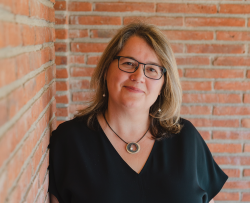
Anna Matamala, BA in Translation (UAB) and PhD in Applied Linguistics (UPF, Barcelona), is a Full Professor at the Universitat Autònoma de Barcelona. Leader of Transmedia Catalonia research group, Anna Matamala has participated (DTV4ALL, ADLAB, HBB4ALL, ACT, ADLAB PRO, IMAC, Traction, Mediaverse) and led (AVT-LP, ALST, VIW, NEA, EASIT, RAD) funded projects on audiovisual translation and media accessibility. She is currently leading the Spanish project WEL (with Carme Mangiron) and the knowledge transfer network AccessCat and participates in the European project ATHENA. She has taken an active role in the organisation of scientific events such as the Media for All conference or the Advanced Research Audio Description Seminar ARSAD and has published extensively in international journals such as Meta, The Translator, Perspectives, Babel, Translation Studies, among others. She is the author of a book on interjections and lexicography (IEC, 2005), co-author (with Eliana Franco and Pilar Orero) of a book on voice-over (Peter Lang, 2010), author of a book on audiovisual accessibility and translation (Eumo, 2019), and co-editor of various volumes on audiovisual translation and media accessibility. Joan Coromines Prize in 2005, APOSTA Award to Young Researchers in 2011, Dr. Margaret R. Pfanstiehl Memorial Achievement Award in Audio Description Research and Development 2021. Her research interests are audiovisual translation and accessibility. She is also actively involved in standardisation work.
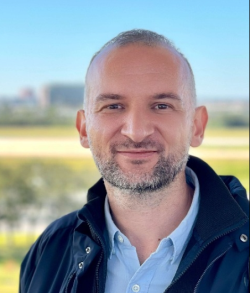
Uglješa Stankov, a Full Professor at the Department of Geography, Tourism, and Hotel Management at the University of Novi Sad, is an expert in the field of tourism sustainability.
This year he was appointed for panel of experts for 2024 European Capitals of Smart Tourism and European Green Pioneer of Smart Tourism (former EDEN) competitions. For three years in a row, he holds first place as the most cited author in the field of Tourism, Leisure, and Hospitality Management in Serbia according to Scopus, and the most cited author in tourism and social geography in Vojvodina.
With a focus on both academic and practical research, Dr Stankov's expertise lies in addressing sustainability from multiple angles. He delves into the physical and organizational aspects of tourism destinations, meticulously measuring the environmental impact of tourism activities and devising strategies to mitigate these effects through agile tourism management. Dr Stankov is also well-versed in spatial information analysis, location intelligence, pro-environmental marketing and branding techniques, emphasizing the importance of promoting sustainable practices. Furthermore, he explores innovative ways to incorporate tourism technology to enhance sustainability efforts. On the other side of his research, Dr Stankov explores the transformative power of mindfulness-guided experiences on consumer behaviour, recognizing them as catalysts for social and personal change. Through his multidimensional research, Dr Uglješa Stankov significantly contributes to the advancement of sustainable practices and the understanding of the role of mindfulness in shaping the tourism industry.
His recent book published by Elsevier The Mindful Tourists, among other topics, analyses the mindfulness movement as a behavioural change agent toward a more sustainable tourism economy. He was the main internal evaluator for impact assessment of European Capital of Culture Novi Sad 2022 and a member of a research team to evaluate sustainability initiatives and impact for Expo 2020 Dubai.
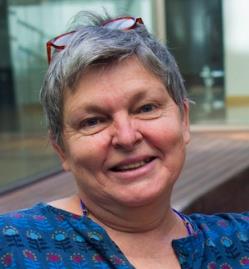
PhD (UMIST, UK) works at Universitat Autònoma de Barcelona (Spain) in the TransMedia Catalonia Lab. She has written and edited many books, near 100 academic papers and almost the same number of book chapters --all on Media Accessibility. Leader and participant on numerous EU funded research projects focusing on media accessibility. She works in standardisation and participates in the UN ITU IRG-AVA - Intersector Rapporteur Group Audiovisual Media Accessibility. She has been working on Immersive Accessibility for the past 4 years first in a project called ImAc, which results are now further developed in TRACTION, MEDIAVERSE, MILE, and has just started to work on green accessibility in GREENSCENT. She led until December 2022 the EU network LEADME on Media Accessibility. She is the Co-Chair of Study Group on Accessibility and Inclusion in the ITU Metaverse Focus Group.
For more info please go to: https://webs.uab.cat/pilarorero/
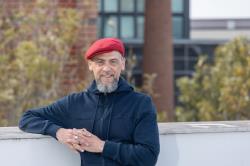
Horacio Saggion is chair in Computer Science and Artificial Intelligence at the Department of Information & Communication Technologies, Universitat Pompeu Fabra (UPF), Barcelona, Spain. He was appointed by UPF in 2010 as a Ramón y Cajal research fellow from the Spanish Ministry of Science and he was promoted to full professor in 2021. Horacio is currently director of the Large Scale Text Understanding Systems Lab of the TALN Natural Language Processing Group where he Works in several areas of Natural Language Processing (NLP) automatic text summarization, text simplification, NLP for Sign Languages, information extraction, figurative language, sentiment analysis and related topics. His work combines symbolic and statistical techniques. Since his arrival he has obtained funding to carry out his research from different national and international organizations Ministerio de Industria, Turismo y Comercio (Proyecto Simplext 2010-2013), Ministerio de Economía y Competitividad, and the European Commission. He also collaborates with the industry through contracts, projects and Doctoral PhDs. Horacio is the project coordinator of the recently Horizon Europe funded project iDEM (Innovative and Inclusive Democratic Spaces for Deliberation and Participation - #101132431).
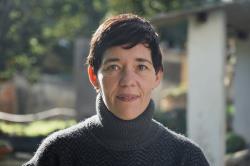
Estella Oncins PhD in Ambient Intelligence from the Universitat Autònoma de Barcelona. She has a large experience in providing accessibility for live events, and as an audio describer for Liceu Opera House. Her research areas are media and digital accessibility in multiple platforms and contexts, with a strong interest in technological integration. More recently, her research approaches questions related to virtual and immersive environments dealing with accessibility, inclusion and diversity. She has collaborated with the Education and Outreach Working Group (EOWG) from W3C/WAI and is currently involved in the ISO/IEC JTC 1/SC 36/AHG 5 “Blockchain in education”. She is a partner in different European founded Erasmus+ and H2020 projects in the field of digital and media accessibility. Currently, she is the coordinator of the MA in Audiovisual Translation at UAB and is senior researcher at the TransMedia Catalonia research group.
-
 C3. Access to information and knowledge
C3. Access to information and knowledge
-
 C4. Capacity building
C4. Capacity building
-
 C6. Enabling environment
C6. Enabling environment
-
 C7. ICT applications: benefits in all aspects of life — E-environment
C7. ICT applications: benefits in all aspects of life — E-environment
-
 C8. Cultural diversity and identity, linguistic diversity and local content
C8. Cultural diversity and identity, linguistic diversity and local content
-
 C9. Media
C9. Media
-
 C11. International and regional cooperation
C11. International and regional cooperation
The session will link to activities and topics related to: C3. Access to information and knowledge
C4. Capacity building
C6. Enabling environment
C7. ICT applications: benefits in all aspects of life — E-environment
C8. Cultural diversity and identity, linguistic diversity and local content
C9. Media
C11. International and regional cooperation
-
 Goal 4: Ensure inclusive and equitable quality education and promote lifelong learning opportunities for all
Goal 4: Ensure inclusive and equitable quality education and promote lifelong learning opportunities for all
-
 Goal 8: Promote inclusive and sustainable economic growth, employment and decent work for all
Goal 8: Promote inclusive and sustainable economic growth, employment and decent work for all
-
 Goal 11: Make cities inclusive, safe, resilient and sustainable
Goal 11: Make cities inclusive, safe, resilient and sustainable
-
 Goal 13: Take urgent action to combat climate change and its impacts
Goal 13: Take urgent action to combat climate change and its impacts
-
 Goal 17: Revitalize the global partnership for sustainable development
Goal 17: Revitalize the global partnership for sustainable development
Goal 4 on inclusive and equitable quality education and promotion of life-long learning opportunities
for all focuses on eliminating gender disparities in education and ensuring equal access to all levels
of education and vocational training for the vulnerable, including persons with disabilities. In
addition, the proposal calls for building and upgrading education facilities that are child, disability
and gender sensitive and also provide safe, non-violent, inclusive and effective learning environments
for all.
Goal 8 to promote sustained, inclusive and sustainable economic growth, full and productive
employment and decent work for all, the international community aims to achieve full and productive
employment and decent work for all women and men, including for persons with disabilities, and
equal pay for work of equal value.
Closely linked is Goal 10, which strives to reduce inequality within and among countries by
empowering and promoting the social, economic and political inclusion of all, including persons with
disabilities.
Goal 11 would work to make cities and human settlements inclusive, safe and sustainable. To realize
this goal, Member States are called upon to provide access to safe, affordable, accessible and
sustainable transport systems for all, improving road safety, notably by expanding public transport,
with special attention to the needs of those in vulnerable situations, such as persons with disabilities.
In addition, the proposal calls for providing universal access to safe, inclusive and accessible, green
and public spaces, particularly for persons with disabilities.
Goal 13: To take urgent action to combat climate change and its impacts, by changing behaviours.
Goal 17 stresses that in order to strengthen the means of implementation and revitalize the global
partnership for sustainable development, the collection of data and monitoring and accountability of
the SDGs are crucial. Member States are called upon to enhance capacity-building support to
developing countries, including least developed countries (LDCs) and small island developing states
(SIDS), which would significantly increase the availability of high-quality, timely and reliable data
that is also disaggregated by disability.
https://source-project.eu
https://www.greenvetproject.eu
https://webs.uab.cat/transmedia/
https://accesscat.net/en
https://lead-me-cost.eu/
https://inamath.uniri.hr/scimag/
iDEM: https://idemproject.eu/
TALN: https://www.upf.edu/web/taln
TWITTER:@h_saggion
SCHOLAR: https://scholar.google.com/citations?user=WMrCFCIAAAAJ&hl=en
LinkedIN: https://www.linkedin.com/in/horacio-saggion-1749b916
LinkedIN iDEM : https://www.linkedin.com/company/idem-project-eu/
https://www.green-scent.eu/
https://clear-climate.com/